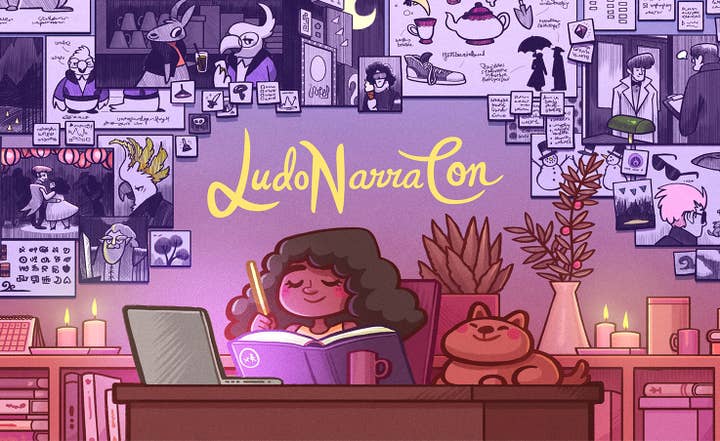Physical events are in doubt for 2020 -- it's time to dive into digital
LudoNarraCon organiser Chris Wright sees little hope for physical events this year, so the door is open for innovation in the digital space
In late 2018 we at Fellow Traveller asked ourselves a question: What would we do if game conventions didn't exist?
It was a question motivated by an increasing sense that we needed to break from our established habits. Our answer was to create LudoNarraCon, a digital festival for narrative games. Held on Steam, it replicates many of the aspects of physical conventions: exhibitors, demos, panels, and we even have passes that give journalists special access and allow the exhibitors to pitch to attending media.
We held the first event in May 2019, and attracted 850,000 attendees. The 2020 edition takes place this weekend, with double the content and, we hope, double the attendance -- you can learn more about the event here. We never expected it to be this way, but our hypothetical is suddenly a reality, and we find ourselves pioneers in something that feels like it must rapidly become the norm.
There will be no physical events any time soon
I don't want to focus too much on the negative or claim that I know exactly what is going to happen, but it seems that major events are extremely unlikely to happen in 2020 and could potentially be absent for much longer.

I hope I'm wrong, but there seem to be many issues making it very hard for large events to return: the potential for new clusters of infection; the practical restrictions that might be placed on events if they are allowed, like temperature checks, reduced numbers, and restrictions on international travel; whether or not companies will be willing or insured to send employees to a large event; whether event marketing budgets will be reallocated, and the general impact of the coming recession.
This is terrible news for the industry, and I can understand why many are hopeful the break is going to be shorter. As an industry, however, I would argue that our efforts should be directed at what to do without physical events. Being optimistic is understandable, but resources sunk into events that are highly unlikely to happen is effort that could be going toward creating something new.
Adversity is the mother of invention
The enemies of invention are comfort and established norms that are risky to pitch against. Right now we have a window of opportunity where we are being forced to do things another way -- we're all out of our comfort zone and the established norms are out the window. It's a huge opportunity for disruption and innovation. Together we could really make some changes and break out of old patterns.
Resources sunk into events that are highly unlikely to happen is effort that could be going toward creating something new
A convention brings games and gamers together. They have important elements such as discourse and discussion, the ability to discover a new game or find out more about a game you love, to meet the developers and maybe have the chance to talk with them. This interactivity is what makes conventions so great.
While some aspects of events are irreplaceable, many can be replicated in digital format with many benefits over their physical equivalents.
Access for all
Fellow Traveller's sales as an indie label are spread across the globe, with the US, China, Europe, Russia, Japan and others as key markets. There's just no way to reach all of these markets with a physical presence -- the travel time and costs are simply not viable.
With a digital event we can be everywhere in the world without leaving home. The potential to reach a global audience simultaneously is hugely powerful. Check out the chart below of the top ten countries attending LudoNarraCon 2019, for example. Of these ten, we'd only ever exhibited physically in four of them.
Digital events offer greater accessibility, removing obstacles related to wealth (digital events can be free or cheaper to attend and also cheaper to take part in as a developer), location (it doesn't matter where you live, you can still take part either as an exhibitor or panelist or attendee), and physical access. It can also help some attendees if you can pause a panel, or stream or play the demo in your own time or with your own equipment.
Opening up access to a wider range of people lifts us all up.
More bang for your buck and your time
Digital conventions can also be dramatically cheaper. For LudoNarraCon, we do not charge the other exhibitors to take part. Most teams that took part in the 2019 event reported spending around $100 total on their participation, and around ten to 20 hours to prepare and participate -- that's compared to around $5000-plus and 100-plus hours on the last physical convention they attended.
The average result for unreleased games was 4,000 to 5,000 Steam wishlist additions, and 30,000 to 50,000 people coming to their exhibition booth, aka their Steam store page. The teams that provided a demo saw 2,000 to 3,000 players.
These numbers are far in excess of the results we used to see at physical events, and these were just for the first year. We're hoping to drive much better numbers this weekend.
Drowning in data
A huge advantage of digital events is that you can get deep amounts of data very quickly and easily, occasionally in real time. Through a combination of Steam's data and Google Analytics, we could see the traffic to our main event page and also our “booths”, the countries or even cities it was coming from, how long they spent on the page, how many wishlists we got, how many publisher follows, how many viewers for the streams, how many demo downloads, how many of those downloads converted to actual players, and how long those people spent playing the demo.
What you can measure, you can manage.
What could the future hold?
Here's what excites me about what it could mean if we really dive into digital consumer events:
- Other platforms catching up to Steam
Through a combination of features like store page streaming, wishlisting, demo downloads, chat, and its new events function, Valve has created the perfect venue for digital festivals. Will other platforms now invest in these areas?
- Rapid iteration and innovation
Last year we had to put everything together from scratch. This year we've been able to build on our experience, and Steam has run two game festivals of their own. We hope to see others build on what we do this year, and in fact are keen to share what we've learned and help others to do exactly that.
- A shift in power
Just as digital shifted entrenched players and power structures in other areas, I would expect it to do the same in the events space. This is disruptive and a risk for establishment players who don't adapt quickly enough, but it's always beneficial to the wider industry and consumers in the end.
- A return to physical events with a renewed focus on community and connection
When events do come back, the landscape will have been altered significantly. I believe they'll need to lean into what makes a physical event unique, and I have no doubt events companies and organisers will rise to that challenge. I'm looking forwards to what they come up with.
- A combination of digital and physical
Steam has already been tying digital promotion to major physical events such as GDC, E3 and Gamescom, with fantastic benefits for the participating developers. I am excited to see what happens when physical events come back and leverage all that we learn from digital events in the next year. What hybrid models can emerge that allow global audiences to participate in localised events?
LudoNarraCon 2020 will run from April 24 to 27 on Steam, featuring demos, panels and livestreams from developers working with narrative games.
Chris Wright is the Founder and Managing Director at Fellow Traveller, an indie label focused on narrative games and the publisher of titles such as In Other Waters, Neo Cab, Hacknet and Orwell. Fellow Traveller is also the organiser of LudoNarraCon, a digital festival celebrating narrative games.

